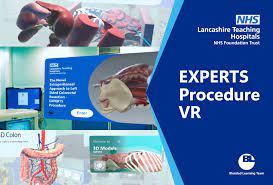
The Benefits of LTHTR eLearning
Learning and Teaching in the Hospital Theatre (LTHTR) is a crucial aspect of medical education. In recent years, eLearning has revolutionised the way healthcare professionals acquire and enhance their skills. Let’s explore the numerous benefits that LTHTR eLearning brings to the medical field.
Accessibility and Flexibility
One of the key advantages of LTHTR eLearning is its accessibility. Healthcare professionals can access learning materials from anywhere, at any time, using various devices such as laptops, tablets or smartphones. This flexibility allows learners to study at their own pace, fitting education around their busy schedules.
Interactive Learning Experience
LTHTR eLearning offers an interactive learning experience through multimedia elements such as videos, animations and simulations. These engaging tools help learners visualise complex medical procedures and concepts, making learning more effective and enjoyable.
Cost-Effective Training
Traditional training methods in hospital theatres can be costly due to factors such as travel expenses, accommodation and facility rental fees. LTHTR eLearning eliminates these costs by providing virtual training environments that are just as effective as in-person sessions but without the financial burden.
Real-Time Feedback and Assessment
Educators can track learners’ progress in real-time through online assessments and quizzes. This immediate feedback allows for timely interventions to address any gaps in understanding and ensures that learners are continuously improving their skills.
Continual Professional Development
LTHTR eLearning enables healthcare professionals to engage in continual professional development by accessing up-to-date information on new medical technologies, procedures and best practices. This ongoing learning ensures that practitioners remain at the forefront of their field.
Collaborative Learning Opportunities
Educational platforms for LTHTR eLearning often include features that promote collaboration among learners. Discussion forums, group projects and virtual case studies encourage knowledge sharing and peer-to-peer support, fostering a sense of community among healthcare professionals.
In Conclusion
LTHTR eLearning is a powerful tool that enhances medical education by providing accessible, interactive and cost-effective training opportunities for healthcare professionals. By embracing this innovative approach to learning and teaching in hospital theatres, we can ensure that our healthcare workforce remains skilled, knowledgeable and prepared to deliver high-quality care to patients.
Top 5 Tips for Creating Effective and Engaging Elearning Content
- Ensure the elearning content is engaging and interactive to keep learners interested.
- Provide clear instructions on how to navigate through the elearning modules.
- Include multimedia elements such as videos, images, and audio to enhance learning experience.
- Incorporate quizzes or assessments to evaluate learner understanding and retention of the material.
- Encourage active participation through discussion forums or group activities within the elearning platform.
Ensure the elearning content is engaging and interactive to keep learners interested.
To maximise the effectiveness of LTHTR eLearning, it is essential to ensure that the content is engaging and interactive. By incorporating multimedia elements, interactive quizzes, simulations and real-life case studies, educators can create a dynamic learning experience that captures learners’ attention and maintains their interest throughout the training process. Engaging content not only motivates learners to actively participate but also enhances knowledge retention and application of skills in real-world hospital theatre settings.
Provide clear instructions on how to navigate through the elearning modules.
To maximise the effectiveness of LTHTR eLearning, it is essential to provide clear instructions on how to navigate through the eLearning modules. Clear and concise guidance on accessing, progressing and interacting with the modules can significantly enhance learners’ understanding and engagement. By ensuring that healthcare professionals have a seamless experience moving through the educational content, educators can optimise the learning process and empower learners to make the most of their training opportunities in hospital theatre settings.
Include multimedia elements such as videos, images, and audio to enhance learning experience.
Enhancing the learning experience in LTHTR eLearning can be achieved by incorporating multimedia elements such as videos, images, and audio. By integrating visual and auditory aids, learners are provided with a more engaging and interactive educational environment. Videos can demonstrate complex medical procedures, images can illustrate anatomical structures, and audio can reinforce key concepts. These multimedia elements not only make learning more dynamic but also cater to different learning styles, ensuring a comprehensive understanding of the material being taught.
Incorporate quizzes or assessments to evaluate learner understanding and retention of the material.
To enhance the effectiveness of LTHTR eLearning, it is recommended to incorporate quizzes or assessments as a means to evaluate learner understanding and retention of the material. By including interactive elements like quizzes, educators can gauge the comprehension levels of healthcare professionals and identify areas that may require further clarification or reinforcement. These assessments not only serve as a tool for evaluating learning outcomes but also provide learners with valuable feedback to help them track their progress and improve their knowledge retention over time.
Encourage active participation through discussion forums or group activities within the elearning platform.
To maximise engagement and learning outcomes in LTHTR eLearning, it is essential to encourage active participation among healthcare professionals. One effective way to achieve this is by incorporating discussion forums and group activities within the eLearning platform. By fostering collaborative interactions, learners can share insights, ask questions, and exchange experiences, creating a dynamic learning environment that promotes knowledge sharing and peer-to-peer support. Active participation through such interactive features not only enhances understanding of medical concepts but also cultivates a sense of community and camaraderie among healthcare professionals striving to improve their skills in the hospital theatre setting.






